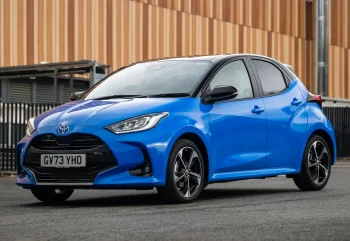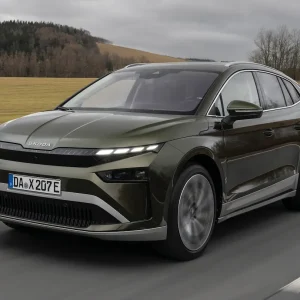
The current-generation Toyota Yaris has seen plenty of acclaim since it was first introduced in 2020. But time waits for no car, hence the arrival now of a new facelifted version.
A significant update with this is the introduction of a new, more powerful hybrid engine option to the range. This produces 130hp, and is available with the GR Sport and Premiere Edition equipment grades – the latter also a new, range-topping addition to the line-up, which we’re testing here. The lower-spec Icon, Design, and Excel grades retain the existing 116hp hybrid powertrain.
According to Toyota, the significance of the 130hp engine isn’t so much the power increase as a 30% torque level boost, and also a more linear power delivery, which is designed to reduce noise complaints often associated with CVT transmissions. On the road, however, we’d say the success of this is limited. Acceleration is fine, but it’s hard to notice much difference compared with the 116hp engine (officially the new one is only half a second quicker from 0-62mph). In addition, with the 130hp engine you get quite a loud rumbling engine note when accelerating, like a bad impression of a 1960s muscle car, which happens during normal town driving as well as at higher speeds.
That’s not the only annoying noise the Yaris makes either, thanks to a warning that sounds when the speed limit is exceeded. This sounds admirable, but the system is slow to react when the limit changes, so when for instance you leave a built-up area and pass a national speed limit sign, accelerating from 30-60mph produces a few seconds of bonging before the system catches up to the limit having increased. You won’t be surprised to hear we didn’t wait long on our test drive before switching this system off. Hopefully long-term users will find this to be a sole misstep among a widely upgraded package of safety systems with the facelifted Yaris, including ‘acceleration suppression’, designed to prevent low-speed rear-end shunts, and ’emergency driving stop’, designed to safely halt the car if the driver is incapacitated.
Unwanted bonging aside, the Yaris is a relaxed and easy drive, especially around town, which we’re sure will continue to win it plenty of favour with most shopping in this segment. However, the ride with the Premiere Edition is surprisingly firm, given that this seems like a luxury-focused grade, rather than one with sporting pretensions like the GR Sport. As for handling, the Yaris corners very reliably, and can change direction quickly when needed, although there isn’t much sense of fun or agility.
A feeling of disappointment with this spec continues when we consider its interior trim, where there is quite a lot of hard plastic present for a range topper, though at least in design terms it’s fairly interesting. Premiere Edition models do benefit from a useful head-up display, which functions well. You also get an impressive-looking 12.3in driver display, and an updated 10.5in infotainment screen which is also good, with its icons bigger and easier to hit on the move than with most systems, although a hand-bracing shelf underneath would be useful.
Rear seat legroom is okay, but tall adults may struggle for headroom, while a 286-litre boot is a bit on the small side. So far, you’ll notice we’ve not had much good to say about the Premiere Edition grade, and this doesn’t change when we consider its price. At £28,715 P11D it’s very expensive for a small car, with a range-topping version of the also-hybrid Renault Clio coming in nearly £5,000 cheaper – a difference that’s hard to justify.
We certainly wouldn’t write off the Yaris, a car we’ve praised in the past, overall – but would suggest that lower-powered, lower-spec versions will better suit most fleet needs. Toyota’s own projections back this up – it expects only 5% of new Yarises sold in the UK to be Premiere Editions, versus 50% for the mid-range Design grade.
Positive: Easy to drive, upgraded screens impress
Negative: Premiere Edition spec pricey, new powertrain not a gamechanger
Standard equipment: 16in alloy wheels, wireless Apple Carplay and Android Auto connectivity, 9in infotainment screen, reversing camera, front fog lights, automatic headlights and wipers, leather steering wheel and gear lever, automatic air-conditioning, power-adjustable heated door mirrors, Toyota Safety Sense (pre-collisions system, acceleration suppression, proactive driving assist, steering assist, emergency driving stop system, rear seat reminder system, adaptive cruise control, overtaking prevention support, preliminary deceleration/turn signal-linked control, lane trace assist, road sign assist.
Engines: Hybrid: 116hp 1.5, 130hp 1.5
Equipment grades: Icon, Design, Excel, GR Sport, Premiere Edition
Transmissions: CVT automatic
Toyota Yaris 1.5 Hybrid Premiere Edition
P11D: £28,715
Residual value: 43%
Depreciation: £15,964
Fuel: £6,047
Service, maintenance and repair: £2,584
Cost per mile: 40.99p
Fuel consumption: 65.4mpg
CO2 (BIK %): 99g/km (24%)
BIK 20/40% a month: £115/£230
Luggage capacity: 286 litres
Engine size/power: 1,490cc/130hp
Score: 6/10





